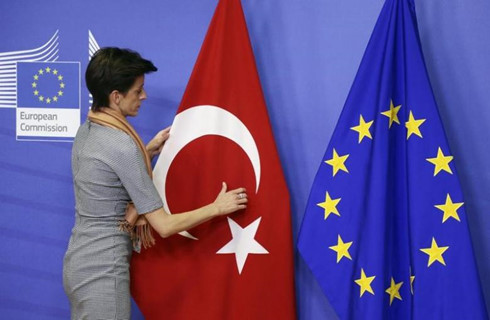EU criticises Turkey but not ready to halt membership talks
- Turkey sacks 10,000 more civil servants, shuts media in latest crackdown
- 100000 Iraqis may flee Mosul for Syria, Turkey: U.N.
- Russia and Turkey sign gas deal, seek common ground on Syria as ties warm
As the 28 EU foreign ministers met in Brussels, President Tayyip Erdogan said he was ready to hold a referendum on whether to continue the membership talks and reiterated that he would restore the death penalty - a move sure to scupper the EU talks - if his parliament passed such a law.
Turkey has suspended, dismissed or detained at least 110,000 people, including soldiers, judges and teachers, since the coup. Critics of President Tayyip Erdogan accuse him of using it as a pretext to crush dissent, a charge he denies.
 |
| A woman adjusts the Turkish flag next to the European Union flag before the arrival of Turkish Prime Minister Ahmet Davutoglu (unseen) at the EU Commission headquarters in Brussels January 15, 2015. (Photo: Reuters) |
"I am not for the continuation of entry negotiations and I believe that this Turkey does not have a place in the European Union," said Austrian Foreign Minister Sebastian Kurz.
Luxembourg and Belgium were also critical of Turkey, but the bloc's most powerful members, France and Germany, support continued engagement, arguing that ending the accession negotiations now would do more harm than good.
"...Turkey is too important to us - not least because of the close personal times between our two countries - that we could afford to renounce dialogue, particularly in these difficult times," German Foreign Minister Frank-Walter Steinmeier told reporters before leaving for a one-day visit to Ankara.
Boris Johnson, the foreign minister of Britain, which intends to leave the EU, also cautioned against over-reaction to events in Turkey, a large, strategically important, mainly Muslim country on the EU's southeastern flank.
"We should not push Turkey into a corner, we should not overreact in a way that is against our collective interests," he said.
Despite its increased concerns over human rights and press freedoms in Turkey, the EU has often toned down its criticism of Erdogan and his government, whose cooperation it needs to keep low the number of refugees and migrants reaching Europe via Greece from Turkey.
More than 1.3 million people arrived in Europe last year, triggering bitter disputes between EU member states over how to handle them. The deal with Turkey, though much criticised by rights groups, has reduced the influx to a trickle.

